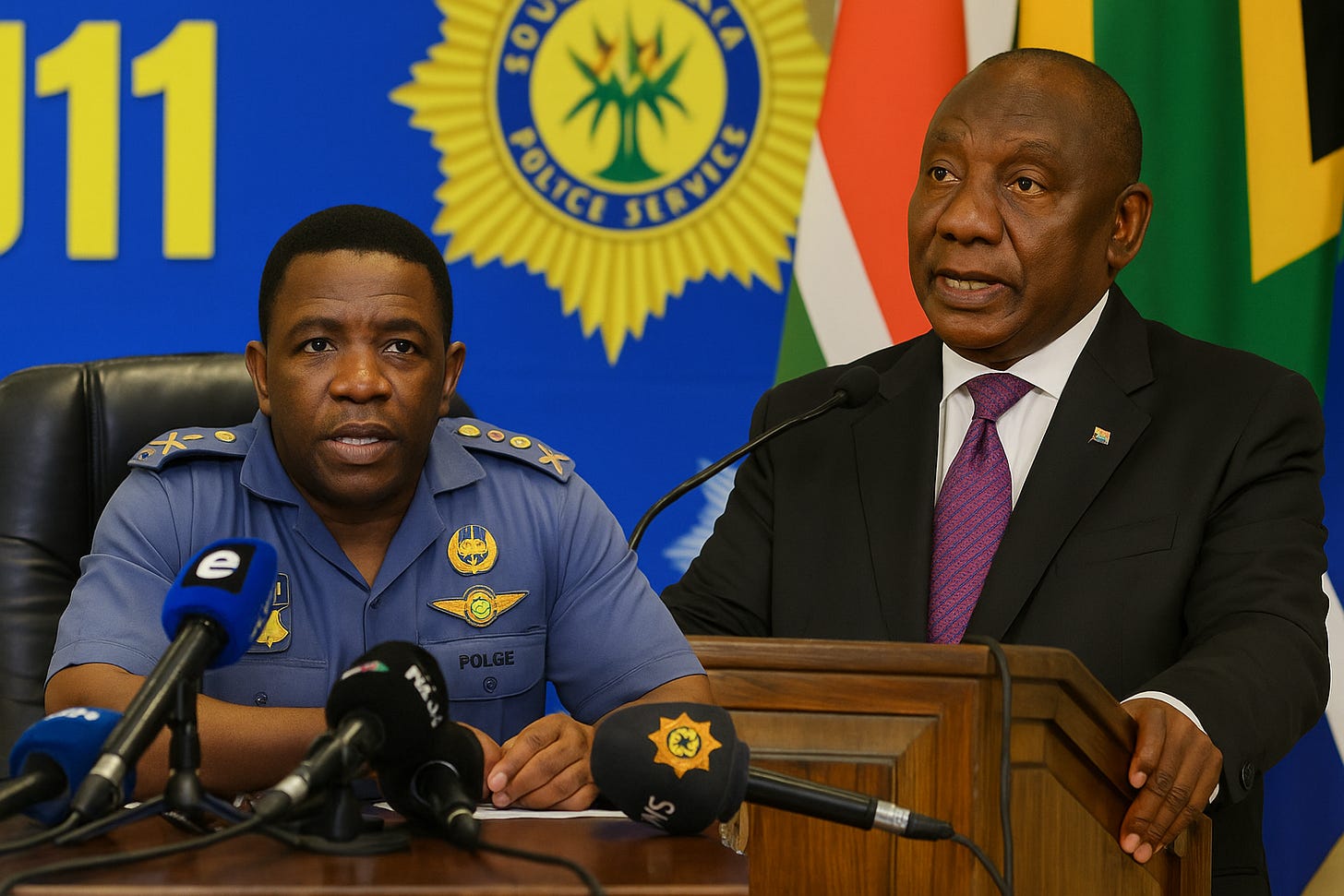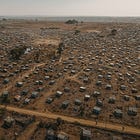Theatre of Inquiry
If you want something talked about, form a committee. If you want it buried, form a commission.
Due to a potential lack of enough talking at the National Dialogue, President Cyril Ramaphosa has announced the creation of yet another commission of inquiry.
It has become a familiar thing to South Africa as a political scandal drops, public pressure builds, and rather than act through existing institutions, the government announces a fresh panel to investigate what everyone already knows. This time, it’s in response to explosive claims made by Lieutenant-General Nhlanhla “Lucky” Mkhwanazi. Claims that, by any reasonable standard, should have triggered immediate suspensions (not special leave), criminal investigations, or even resignations.
Standing before the press, flanked only by his insignia and a few pages of notes, Mkhwanazi accused Police Minister Senzo Mchunu of obstructing investigations into political assassinations. He said a task team probing those killings had been disbanded on direct instruction. He hinted at high-level collusion with criminal networks and suggested, plainly, that parts of the police service are captured. He did not mince words.
These are not just allegations of incompetence, the likes of which South Africans are generally accustomed to. They are charges of institutional sabotage made by a senior police official in uniform. They strike at the heart of state legitimacy. In any functioning democracy, this would be a moment of reckoning. But in South Africa, true to ANC form, it’s a cue for another commission.
But at least in South Africa our government doesn't bury scandals. They commission it.
Commissions as Political Sedatives
From Marikana (which cost R153 million) to State Capture (R850 million, or nearly four Nkandlas), from Life Esidimeni to the Seriti Arms Deal inquiry (R130 million), the post-apartheid state has routinely turned to commissions when political heat rises. These forums are framed by the ANC as evidence of transparency and institutional introspection. In practice, they serve a different function entirely: to delay, deflect, and defuse. They are political sedatives.
The Zondo Commission, the most sprawling and expensive of them all, produced a forensic account of how the state was hollowed out under Jacob Zuma’s leadership with South Africa still suffering its consequences. But years later, most of its key recommendations remain untouched. Prosecutions, where they’ve even begun, have been sluggish at best.
The Marikana Commission, set up to investigate the police killings of striking miners, ended with little in the way of justice. The Seriti Commission, after four years and over R100 million in taxpayer money, was ultimately dismissed by a court for having “failed manifestly to enquire into key issues.”
The pattern is well established. And it resembles much of political life in South Africa, a fondness to talk about problems as if talking equals doing.
When Talk Becomes a Substitute for Action
Very much like the National Dialogue promises much talk but will likely lead to very little doing to actually “forge a new social compact that drives progress” as it promises on paper.
This tendency isn’t limited to commissions. It reflects a deeper pathology in ANC governance, a belief that talk, in itself, is a form of action. Lekgotlas, strategy sessions, task teams, consultative forums, these are the rituals of the ruling party. Each new crisis brings more dialogue, more performance and more process but little progress.
To be clear, deliberation has its place. But when it becomes endless and when it substitutes for decision-making and shields the powerful from consequence it’s simply performance. It creates the illusion of movement while preserving stasis. The appearance of responsiveness without the burden of responsibility. It reminds me of the British political satire sitcom Yes, Minister, where commissions and inquiries are often suggested as ways to avoid action or kick issues into long grass. South African commissions increasingly feel designed not to act, but to appear to be acting
Who Will Bell the Cat?
Mkhwanazi did what few in his position have dared, he named the cat. He broke ranks and said out loud what many South Africans know discuss around braais and in our taverns, that parts of the state have been compromised by criminal interests. That political killings continue not just because they’re difficult to solve, but because solving them would expose those in power. That the police are not feared by organised crime because, in some cases, they are part of it.
The question now is: who will bell the cat?
If history is any guide, the answer is no one. The President has announced a commission and a report will be written likely years from now with recommendations being made. And then the machine will hum along, unchanged.
But there is a wrinkle this time. In 2024, the ANC dropped below 50% for the first time and it remains in government through an awkward, stitched-together coalition. That changes the political calculus compared to previous times where these commissions have been announced.
The Zondo Commission ran for nearly four years, from 2018 to 2022. The Marikana Commission lasted close to three years, from 2012 to 2015. The Seriti Commission took four years, from 2011 to 2015. The Life Esidimeni arbitration process, though technically shorter, still stretched over nearly two years between hearings and final report.
A coalition government or even a future post-ANC administration might find it politically expedient to do something with the findings of this latest commission. Not to shelve the report, but to act on it. Because unlike previous inquiries, this one may not land on a desk occupied by someone trying to protect the status quo.
If the timeline follows the usual historical pattern, this commission will wrap up between the next local government elections and the 2029 national election. And if polling trends hold, the ANC may not be in charge when that happens. It may not even be the largest party.
Consequences, or Collapse
The ANC’s inability to hold its own accountable will continue to mean that the electorate holds them accountable.
It won’t happen overnight. The ANC’s legacy networks, rural base, and control of state machinery will keep it viable for some time yet. But the change is clear and coming. The ANC’s go-to tactic to avoid accountability is no longer working as reliably as it once did.
This time, the real question isn’t what the report will say. It’s who will be in power when it finally lands.
More articles:
If you found this piece worthwhile, feel free to share it with someone who might appreciate it.
To get future essays delivered directly to your inbox, you can subscribe here:
I welcome thoughtful conversation—feel free to reach out on LinkedIn or follow along on Twitter.
An edited version of this article was published on The Daily Friend. If you'd like to support my writing please subscribe and consider a pledge.
This cover image was created using ChatGPT.






